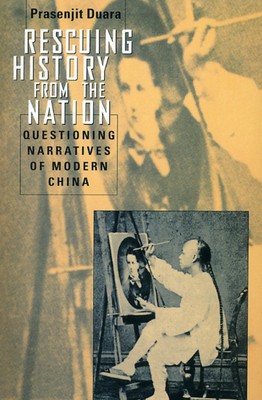
- We will send in 10–14 business days.
- Author: Prasenjit Duara
- Publisher: University of Chicago Press
- ISBN-10: 0226167224
- ISBN-13: 9780226167220
- Format: 14.8 x 22.7 x 1.8 cm, softcover
- Language: English
- SAVE -10% with code: EXTRA
Reviews
Description
Prasenjit Duara offers the first systematic account of the relationship between the nation-state, nationalism, and the concept of linear history. Focusing primarily on China and including discussion of India, Duara argues that many historians of postcolonial nation-states have adopted a linear, evolutionary history of the Enlightenment/colonial model. As a result, they have written repressive, exclusionary, and incomplete accounts.
The backlash against such histories has resulted in a tendency to view the past as largely constructed, imagined, or invented. In this book, Duara offers a way out of the impasse between constructionism and the evolving nation; he redefines history as a series of multiple, often conflicting narratives produced simultaneously at national, local, and transnational levels. In a series of closely linked case studies, he considers such examples as the very different histories produced by Chinese nationalist reformers and partisans of popular religions, the conflicting narratives of statist nationalists and of advocates of federalism in early twentieth-century China. He demonstrates the necessity of incorporating contestation, appropriation, repression, and the return of the repressed subject into any account of the past that will be meaningful to the present. Duara demonstrates how to write histories that resist being pressed into the service of the national subject in its progress--or stalled progress--toward modernity.EXTRA 10 % discount with code: EXTRA
The promotion ends in 17d.17:25:10
The discount code is valid when purchasing from 10 €. Discounts do not stack.
- Author: Prasenjit Duara
- Publisher: University of Chicago Press
- ISBN-10: 0226167224
- ISBN-13: 9780226167220
- Format: 14.8 x 22.7 x 1.8 cm, softcover
- Language: English English
Prasenjit Duara offers the first systematic account of the relationship between the nation-state, nationalism, and the concept of linear history. Focusing primarily on China and including discussion of India, Duara argues that many historians of postcolonial nation-states have adopted a linear, evolutionary history of the Enlightenment/colonial model. As a result, they have written repressive, exclusionary, and incomplete accounts.
The backlash against such histories has resulted in a tendency to view the past as largely constructed, imagined, or invented. In this book, Duara offers a way out of the impasse between constructionism and the evolving nation; he redefines history as a series of multiple, often conflicting narratives produced simultaneously at national, local, and transnational levels. In a series of closely linked case studies, he considers such examples as the very different histories produced by Chinese nationalist reformers and partisans of popular religions, the conflicting narratives of statist nationalists and of advocates of federalism in early twentieth-century China. He demonstrates the necessity of incorporating contestation, appropriation, repression, and the return of the repressed subject into any account of the past that will be meaningful to the present. Duara demonstrates how to write histories that resist being pressed into the service of the national subject in its progress--or stalled progress--toward modernity.

Reviews